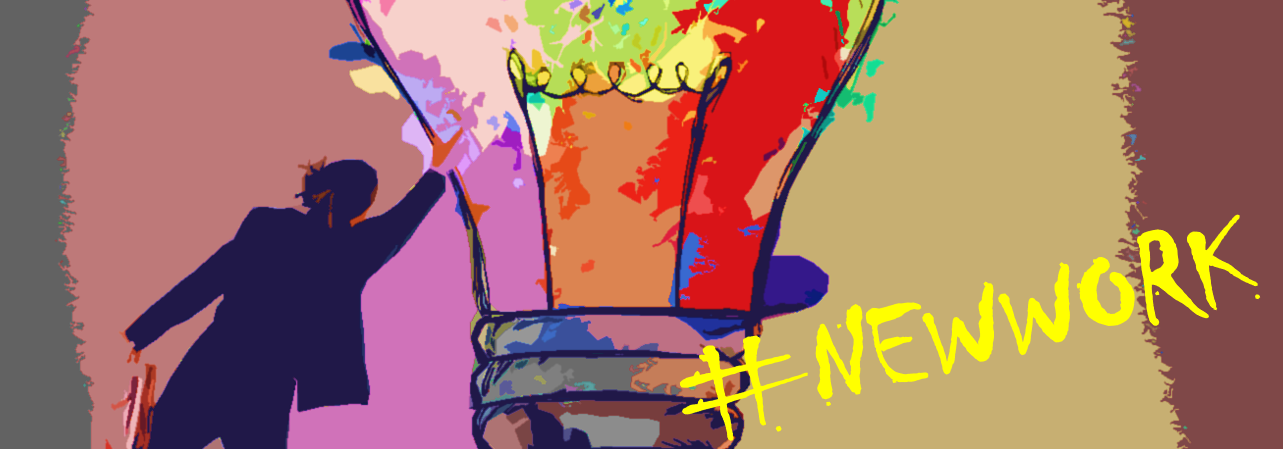“New Work” is a buzzword that is not so new anymore, but has come to stay – and to retire the previous “work” system. After two years of the pandemic at the latest, a large part of our society has arrived in the global-digital age, which has completely new demands on our jobs, employers and their image. But what does New Work actually mean?
The end of traditional hierarchical work organization
Initiated by the industrial revolution, division of labor and standardization entered our everyday life and resulted in ever higher efficiency. In addition, physically demanding work has been increasingly taken over by machines and robots in recent decades, and thanks to technological progress, routine tasks can now be optimized by means of Big Data and artificial intelligence. The credo of our time is to make work processes even faster and more dynamic.
Only creative work and the ability to innovate still cannot be rationalized; they remain the preserve of people in organizations and their longing for meaning, self-determination and freedom in their jobs. These are driving structural change in the world of work, and so “new work” could be seen as an umbrella term for a new, better because more sustainable form of working.
Old hat in a new dress?
New Work is not just about fancy open-plan offices with meeting zones and a casual company cafeteria, or more opportunities and freedom for flexible working – keyword “home office” – but rather about leadership at eye level, which does not necessarily have to be hierarchy-free. Conservative ways of working are giving way to a self-determined work culture. New Work is an employee-centered way of working, where leadership roles lie in facilitating new avenues for creativity, innovation, and development, as well as balancing diverse interests within an organization. Changes in structures and processes cannot be imposed from above but need above all inner transformation, the maturing and growing of employees and teams so that they can shape their complex, flexible external world more competently, more securely and more happily.
A society in which everything strengthens everything
The term New Work was coined by Dr. Frithjof Bergmann, who already in the 1980s dealt with the philosophical question of the human freedom of the individual and saw the previous work system with fixed hierarchies, division of labor and time structures as having reached its end. According to Bergmann, “false labor” is a mild disease for humans that ideally will eventually pass. “New Work” – real work, on the other hand, gives strength and energy and supports people in their development – it is a salvation, what the world needs now. Work and tasks that we really want and a culture that strengthens us sustainably – in Frithjof’s words: A society in which everything strengthens everything. New Work as a promise for the future that aims to meet the individual demands of many. It starts with the question of what you really want to do. It is a combination of self-actualization, self-determination and self-sufficiency.
The difference makes the difference
But how does an organization set sail when the winds of change are blowing? Unfortunately, there are no step-by-step instructions on how to do this, but one thing is clear: collaboration within the company is becoming increasingly important, especially in times of physical distance. Due to rapid technological change, the half-life of knowledge is shortening more and more and can hardly be covered or even “managed” by a single person. Agile new work approaches such as “holocracy” with the role and circle model provide solutions for this, which allow more knowledge to be generated and also retained through innovative forms of collaboration and thus achieve new, better results.
Our consulting work with many companies and experiencing the change process in our own organization have shown us that successful change is never purely bottom-up or top-down, but rather a collaborative process. For each company, however, an individual path must be chosen that corresponds to its values and culture.
Thus, the “war for talent”, which has come to a head due to the massive shortage of skilled workers, has also come to stay. The demands on employers are increasing, and it is those companies that enable their employees to work in a meaningful way and identify with them that can attract and also retain special talent.
 We have the best employees and are looking for more!
We have the best employees and are looking for more!
On this occasion: we consider ourselves lucky to have a colorful team of terrific personalities in the companies of the CONENGA Group.
To ensure that we are also successfully equipped for the challenges of the future and constant change, we are always looking for talented people who would like to take on different roles and exciting tasks as part of a fulfilling job as part of the CONENGA Group.
Sources, inspiration and further links
- “New Work needs Inner Work” – A handbook for companies on the way to self-organization, Breidenbach, Joana; 2nd edition, 2019.
- 7Mind Podcast, René Träder (Lena Marbacher, New Narratives: “How a self-organized company runs”)
- www.workpath.com
- https://www.haufe.de/holacracy-die-holokratische-organisation.html
- https://newwork-newculture.de

